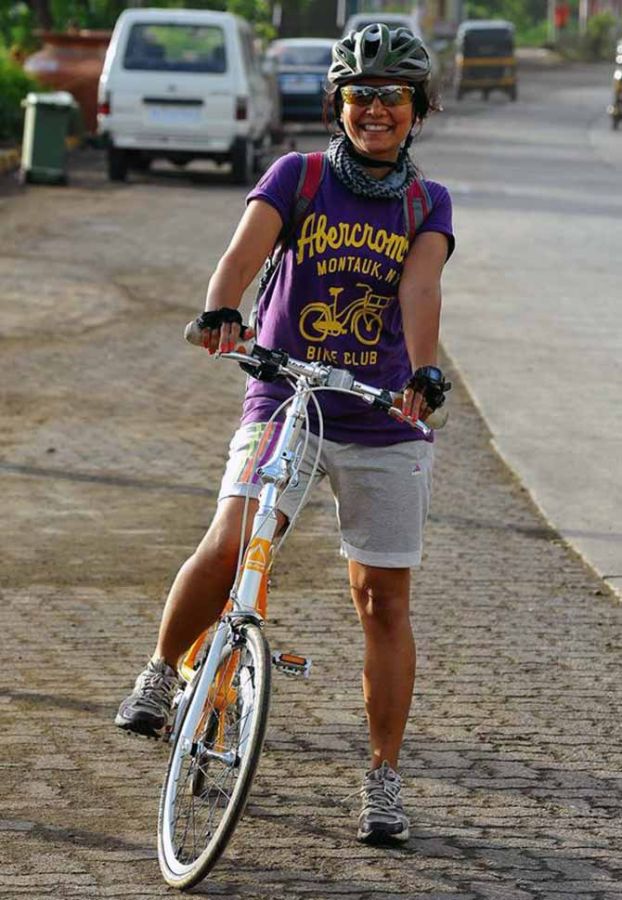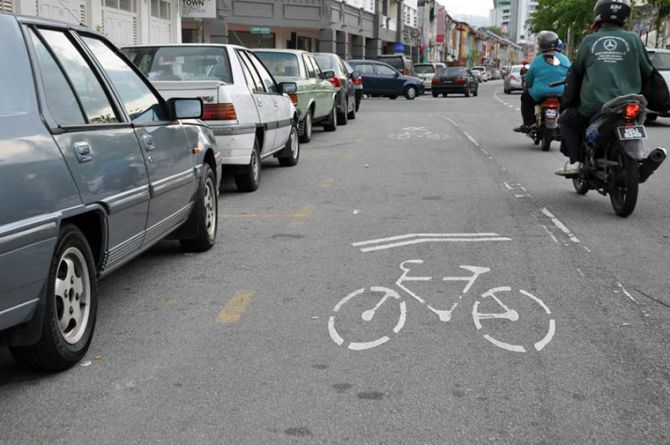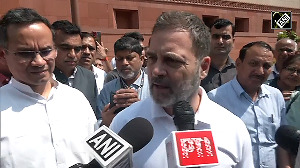Cycling has become fashionable again!
Young, city-bred, successful, enthusiastic Indians are ditching their cars and cycling to work.
You could think of it as a new health fad or a move to save the planet, but there is no denying it signifies a big shift.
Is this 'trend-of-sorts' here to stay or will it fizzle out? Anita Aikara/Rediff.com talks to cyclists about their no-frills mode of transport to work.

Photograph: Courtesy Firoza Suresh
Carbon footprint' seems to be the catch phrase of 2015. Everyone's trying to contribute towards a greener planet.
The result: People are gladly ditching their air-conditioned cars and cycling to work. They're taking their cycles to coffee shops, movie theatres and client meetings too.
You'll find them on the Mumbai-Pune Highway, the Greater Noida Expressway near Delhi, CubbonPark and Queens Road in Bengaluru, Shivaji Nagar and Kothrud in Pune and Bandra Kurla Complex in Mumbai, to name just a few places.
Armed with reflectors, protective cycling gear, sippers and gloves, these enthusiasts seem ready to defy all odds to get to work on their cycles. For them, cycling is a lifestyle choice; a green and healthy choice.
Good for your heart
The benefits of cycling are immense, says Dr Annish Thekkinedath, 29, a resident in internal medicine, Karnataka. "It improves your cardiovascular health, converts yellow fat to brown fat and helps you lose weight," he says.
According to studies conducted at USA's Purdue University, cycling 32 km a week could reduce your risk of heart disease by 50 per cent. It takes care of your daily workouts and is great for your heart, lungs and blood vessels.
But people cycle for other reasons too. For some, like Mumbai-based Firoza Suresh, cycling is a way to save the environment.
For her marriage, she invested in a cycle instead of gold
Firoza works with Firefox Bikes, handling marketing for their western zone. She cycles 24 km every day, to work and back.
It takes the 44-year-old around 40 minutes one way.
Cycling, says Firoza, is easier than travelling by public transport. She considers travelling by local trains a waste of time. "It is a task to get to the railway station and then, from there, to my workplace."
An adherent fan of cycles, Firoza rides the Trek 7100.
Her first cycle was a rented one. Seeing her enthusiasm, her uncle gifted her a second-hand cycle. That is when cycling became her means to commute.
Come rain or sunshine, Firoza has her cycle handy.
She cycled from her home to college and back. She ran errands for her mother on her cycle. People in her neighbourhood in Mulund, Mumbai, were so used to seeing her on those two wheels, they started calling her 'Mulund ki cyclewali (the cyclist from Mulund)'.
When she got married, instead of investing in gold, she invested in a good cycle.
Today, she is a crusader for change with Smart Commute, an initiative that encourages people to cycle to work. She has also collaborated with the Copenhagen-based iVATION to help develop cycling as a culture in India.
She says she has not faced any resistance from people when she cycles to work. "Often, I receive friendly smiles and a thumbs up," she laughs.
'Cycling to reduce footprints'
Pune resident Narendra Pai, 47, used to cycle to work but gave up due to the pollution, long commute and lack of shower facilities at work.
"You step out of your house wearing a white shirt, cycle to work and, by the time you step into office, your shirt has turned brown due to the pollution in Pune," laughs Pai, an after-sales manager at an automobile dealership company.
"People have utter disrespect for cyclists. Motorists drive close to you. At times, they drive as though you don't exist. Cyclists constantly need to be on the lookout."
Pai took to cycling to reduce his carbon footprint. "I come from the two-stroke motorcycle generation. Those bikes were banned as they polluted the air. Cycling to work is my humble contribution towards protecting the environment."
Come 2016 and Pai's office will shift to a new location. The new office will have improved infrastructure, along with bicycle parking and shower facilities.
"It's the kind of setup that lets you head to a party directly from work," says Pai, who is all set to pedal to work on his Giant bicycle, which cost him Rs 38,000.
"The new office will be really close to my home. The short commute will make it an enjoyable ride. The shower facility at the new office comes as a relief."
'My office provides a cycle loan'
Bengaluru-based Arvind Bharathi has many incentives to cycle to work.
The 33-year-old, who heads Runners for Life, says his company provides cycle loans to employees in a bid to encourage more people to cycle.
"In most companies, you get reimbursed for travel. In our company, employees who cycle to work are reimbursed per kilometer. This has encouraged employees to go for client meetings on cycles."
He was apprehensive when he cycled to a client meeting at an IT company.
"I wondered how they would react. But when I entered their campus and saw a large cycle parking stand, it was a pleasant surprise. Their staff is really kicked about cycling."
Arvind used to cycle quite a bit as a child. "I stopped cycling when I went to college. After I landed my first job, I used to go to work on a bike."
Things changed at his present company, which he joined 10 years ago.
"We have plenty of cyclists and a shower facility. There are around 50 people who cycle to work.
"I ditched driving to work as I noticed it makes people agitated. Having to constantly stop at signals and deal with traffic can be really stressful at the start of the day.
"Cycling to work has been a stress-buster for me."
Arvind cycles 7 km to work and back. "It's economical to cycle to work in Bengaluru," he says. "When you purchase a good cycle, there is an initial investment to be made of Rs 25,000 at least. But that is a really good investment."
Abhinav Singh Bhal, 28, senior manager, business development, The Fuller Life, Bengaluru adds, "Companies here have been providing incentives for people cycling to work. That is very encouraging. I know people who cycle 10 km to get to work."
Speed breakers

Parked cycles being stolen and the constant fear of being run down by speeding trucks, buses and other motorists are just some of the fears that cloud the minds of cyclists today.
Arvind adds, "I have often heard people cycling to work in Chennai and Mumbai complain about the humidity in the air and pathetic traffic situation."
India's cycling culture gathering dust?
For people who cycle to work, there are plenty of obstacles. It starts with the lack of civic sense on roads.
Cities like Mumbai, Pune, Bengaluru, Hyderabad and Delhi have dedicated cycling tracks. However, you'll have second thoughts about using them.
"Several cycling tracks in Pune have been encroached upon by hawkers," says 29-year-old fashion consultant Pooja Verma. "At times, you'll spot owners of two-wheelers parking their bikes here. In the evenings, you might end up bumping into people who use them as footpaths."
Mumbai's cycling tracks can really throw you off balance, due to the potholes and gravel. You'll find heaps of unattended garbage lying around. Poorly maintained cycling tracks at the city's business heart, BKC, have discouraged cyclists from using them.
Cycle parking facilities in most metros -- except for Bengaluru and Delhi --are poor.
This year Delhi Metro launched a public bicycle sharing scheme that allows commuters can hire cycles from bicycle shelters, ride it to the station, and leave it at the bicycle shelter there.
It has not found many takers.
"The scheme is a waste," says Rahul Kapadia, 32, manager alliances, American Express. "The roads here are not safe for walking in many places. Expect broken pavements and potholes combined with rash driving. There's no basic infrastructure in place to enable people to cycle. Apart from specific areas in posh localities, people are averse to anything but using their cars. They have a slightly better approach towards cycling in Gurgaon, but only at specific places."
In Bengaluru, while the weather is good for cycling, the traffic plays spoilsport. But the city is clearly leading the cycling revolution, thanks to its cycling culture and numerous start-ups.
"The commute to work in Bengaluru is usually short. The younger employees in start-ups have taken to cycling as it makes economic sense and saves times. As the pay scale in start-ups is not very high, youngsters working with these companies are more inclined to cycle to work," says Arvind.
'My mother would keep calling to ensure I'm safe.'
Abhishek Hajela is quite apprehensive about cycling in the capital. "I love to cycle. Whenever I travel to foreign destinations like Europe and watch cyclists freely taking to the road, I miss cycling!"
Abhishek used to cycle to work for around 8 to 10 km daily. But the increasing pollution and traffic has made him rethink his decision.
"Cycling to work is considered healthy, but not when you are in Delhi. Cyclists are exposed to so much pollution. You can actually feel the pollution when you cycle.
"As a cyclist, you can enjoy cycling at India Gate. Elsewhere, you'll find motorcyclists using the cycling tracks.
"The weather too is not suitable for cycling. There is no shower facility at office. So I used to reach office early, sit under the air conditioner for 20 minutes to dry myself before starting work. It was quite a challenge.
"It is not safe to ride a cycle in Delhi. From the moment I stepped out of my house till I reached work, my worried mother would keep calling me!"
Many of these passionate cyclists face numerous odds to cycle to work. Some find a way. Like Nihar Sawant, 24.
'I'm the fittest guy at work'

Nihar works with a start-up in Mumbai.
"There was a time when I cycled 30 km, from home to work and back," he says.
"Cycling helps me stay fit. I have a sedentary lifestyle and tend to be seated in front of my computer for hours. Cycling to work and back gives me my much needed exercise.
He adds. "Cycling helped me get rid of my stress. When I cycle back from work, I get good sleep. When I wake up the next day, I feel rested."
But cycling to work in Mumbai is risky, says Nihar. "You need to watch out for speeding motorists. On the highway, there are some patches of service road which cyclists can use.
"As a cyclist in Mumbai, I recommend that you cycle to work during peak hours. As the roads are jammed, you can easily make your way through the line of waiting cars.
"I have witnessed cyclists getting injured, especially while changing lanes. I usually wear shiny clothes when I cycle. I have also learned a few hand movements. I cycle with reflectors to make motorists aware of my presence.
"My advice to cyclists is that they should not break rules. Signals are meant to be followed. Respecting traffic rules will definitely get you respect from motorists and other cyclists."
Despite the challenges, Nihar refuses to quit cycling. Instead, through friends and colleagues, he has been encouraging more people to cycle to work.
"Every form of travel is challenging. Cycling is worth the challenge for me," he says.
As for Arvind, his cycling passion has inspired his family as well. His sister started cycling recently. "On my father's 67th birthday, we gifted him a cycle and he's hooked. Now, we are trying to get my mother to join the cycling brigade," he laughs.
Start now!
Do you have a 'much loved' bicycle lying somewhere unused, gathering dust? It's time to bring it out!
There are plenty of cycling clubs in your city. Just enroll in one and you could enjoy the company of like-minded people as you cycle to wherever you need to go.











 © 2025
© 2025